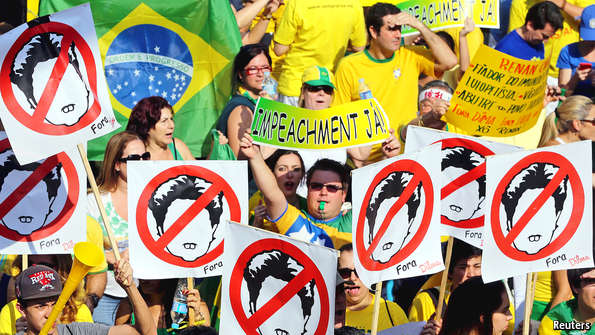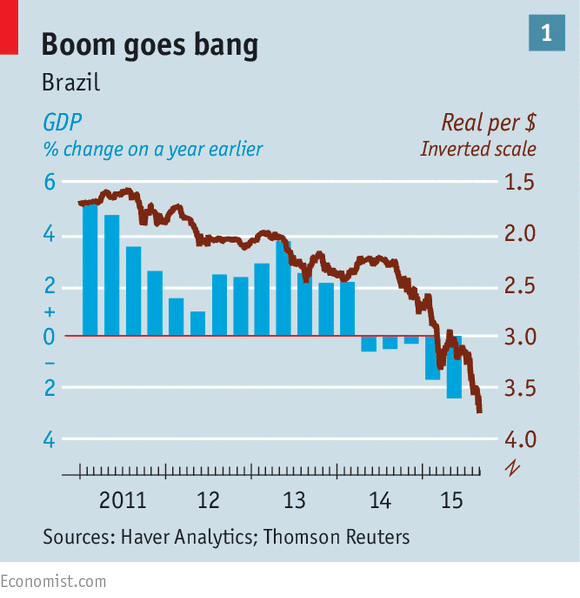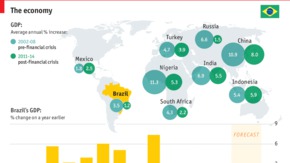[ENGLISH VERSION]
Brazil’s economy
Desperate times, desperate moves
Beset by dismal economic data, Dilma Rousseff tosses Congress a challenge

WHEN a president has single-figure approval ratings, faces calls for
her impeachment, and has lost control of her political base, is she in a
position to play hardball with the country’s legislators? Brazilians
will soon find out.
On August 31st Dilma Rousseff, their president, sent Congress a
budget for 2016 with a gaping primary deficit (before interest payments)
of 30.5 billion reais ($8 billion), or 0.5% of GDP, challenging its
members to close the gap. It was a break with the sound-money practices
that have underpinned Brazil’s economy. It was, some critics say,
illegal. Certainly nothing similar has happened since at least 2000,
when Fernando Henrique Cardoso, then the president, transformed public
finances.

On a charitable view, Ms Rousseff was shocking legislators into
making hard decisions rather than simply blocking her fiscal proposals. A
harsher reading is that she does not know how to lead Brazil out of
recession. The markets took that view. The day after the budget
bombshell, the Ibovespa stock index fell over 2% and the currency closed
at 3.7 per dollar, its lowest since December 2002. On September 2nd,
the central bank held steady a key interest rate it had been raising
since last year.
Public finances have already deteriorated this year. Having
originally planned a primary surplus of 1.1%, in July the government cut
that target to just 0.15%, as interest rates rose and tax receipts
fell. The total deficit this year will be 8-9% of GDP. In August
Moody’s, a rating agency, cut its assessment of Brazil by a notch to
just above junk status. It hinted at worse to come by calling the latest
news a sign of “the fiscal challenges that Brazil continues to face”.
The risk of a downgrade is one reason for the pessimism which, some
pundits think, is now the prevailing mood in the corridors of power.
“The government is basically throwing in the towel,” says Alberto Ramos,
an economist with Goldman Sachs, an investment bank.
Ms Rousseff is in a tight corner. She issued her budget after
scrapping a plan to reinstate a tax on financial transactions that would
have brought in 80 billion reais in 2016. She retreated after her
vice-president, Michel Temer, rejected the idea and told her Congress
would block it. Several opposition figures say that, far from finding a
way to make Congress do homework, the president has broken a
fiscal-responsibility law enacted in 2000 as part of an effort to mend
Brazil’s finances after decades of chaos. They say they may take her to
court.

On this point, the president may be right. Mansueto Almeida, an
economist who is critical of Ms Rousseff, says that though the law
requires the executive to show how its spending will be funded, it
allows a rise in debt. Júlio Marcelo de Oliveira, a prosecutor for the
Federal Court of Accounts, agreed that the president, whose alleged
budgetary misdeeds he has previously investigated, acted legally this
time.
Legal or not, the president’s move weakens her American-trained
finance minister, Joaquim Levy, who was reported to have lobbied for
further spending cuts and was a reassuring figure for markets. Ms
Rousseff has consistently failed to hit economic targets since being
elected in 2010, but in the early days she dodged the political flak.
Many people blamed her then finance minister, Guido Mantega, who was
known for over-promising. Replacing him with Mr Levy was supposed to fix
that problem; his loss of face bodes ill.
To restore credibility, Mr Ramos argues, the government needs to end
up with a primary surplus of 3.0-3.5% of GDP. Simply stabilising the
debt-to-GDP radio is not good enough, he says: it is already too high.
At a minimum, tough horse-trading with Congress looms. Renan Calheiros,
the president of Brazil’s Senate who has had several rows with Ms
Rousseff this year, said on September 1st he would not send the budget
back to her, as many opposition people want. “It is up to Congress to
improve it,” he accepted. And on any fair assessment, Congress shares a
lot of blame for Brazil’s economic woes; for example, it neutered many
of Mr Levy’s better ideas.
Is there any way out? It looks unlikely that tax rises can be
avoided: about 90% of the budget is ring-fenced, leaving little
discretion for spending cuts. If the government were strong and
confident, it might acknowledge the need for a short-term rise in debt
while seeking ways to limit spending on pensions, health and education,
and laying out a long-term plan to restore fiscal health. But pushing
such reforms through Congress would take political will and capital, and
this was not done during Brazil’s boom years when it would have been
easier. Now, says Mr Almeida, “We are paying for all of the mistakes
[of] the past five years.” The mystery, he adds, is why Brazil has not
lost its investment grade already.
Advertisement
 China’s economy: How China’s cash injections add up to quantitative...
China’s economy: How China’s cash injections add up to quantitative...
Free exchange
 The Economist explains: The decline of bees
The Economist explains: The decline of bees
The Economist explains
 Migrants, Christianity and Europe: Diverse, desperate migrants have...
Migrants, Christianity and Europe: Diverse, desperate migrants have...
Erasmus
 Saudi Arabia and America: King Salman visits the White House at last
Saudi Arabia and America: King Salman visits the White House at last
Middle East and Africa
 The American economy: New jobs numbers do little to illuminate the Fed's...
The American economy: New jobs numbers do little to illuminate the Fed's...
Free exchange
 Emerging economies: Turbulent markets in the suspect six
Emerging economies: Turbulent markets in the suspect six
Free exchange
 Daily chart: A discussion with the Donald
Daily chart: A discussion with the Donald
Graphic detail
Advertisement
Products and events
Test your EQ
Take our weekly news quiz to stay on top of the headlines
Take our weekly news quiz to stay on top of the headlines
Want more from The Economist?
Visit The Economist e-store and you’ll find a range of carefully selected products for business and pleasure, Economist books and diaries, and much more
Visit The Economist e-store and you’ll find a range of carefully selected products for business and pleasure, Economist books and diaries, and much more
Advertisement
==//==
[PORTUGUESE VERSION]
'The Economist' dá destaque à crise brasileira
Revista inglesa não poupa críticas aos rumos da economia do país, com ênfase no orçamento deficitário
por Aline Macedo*









Nenhum comentário:
Postar um comentário